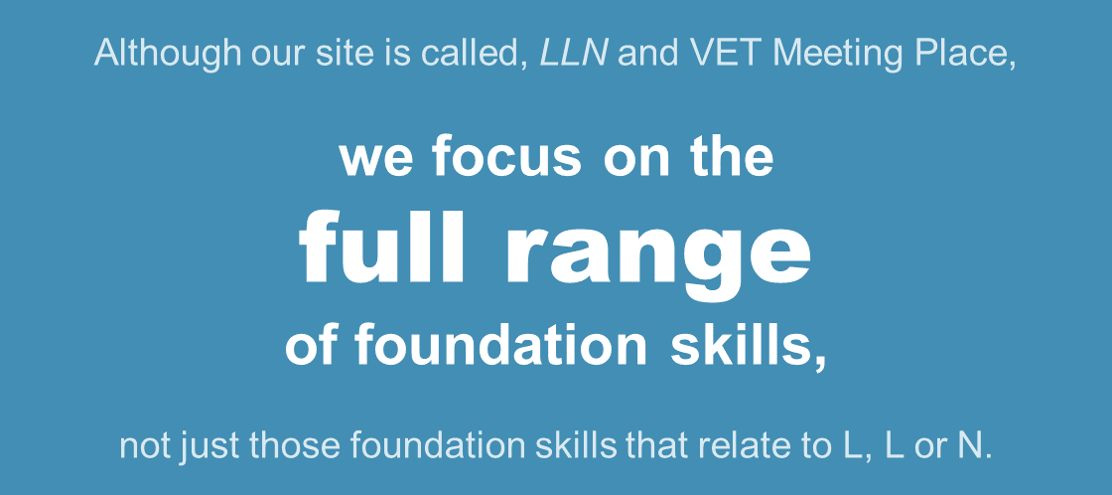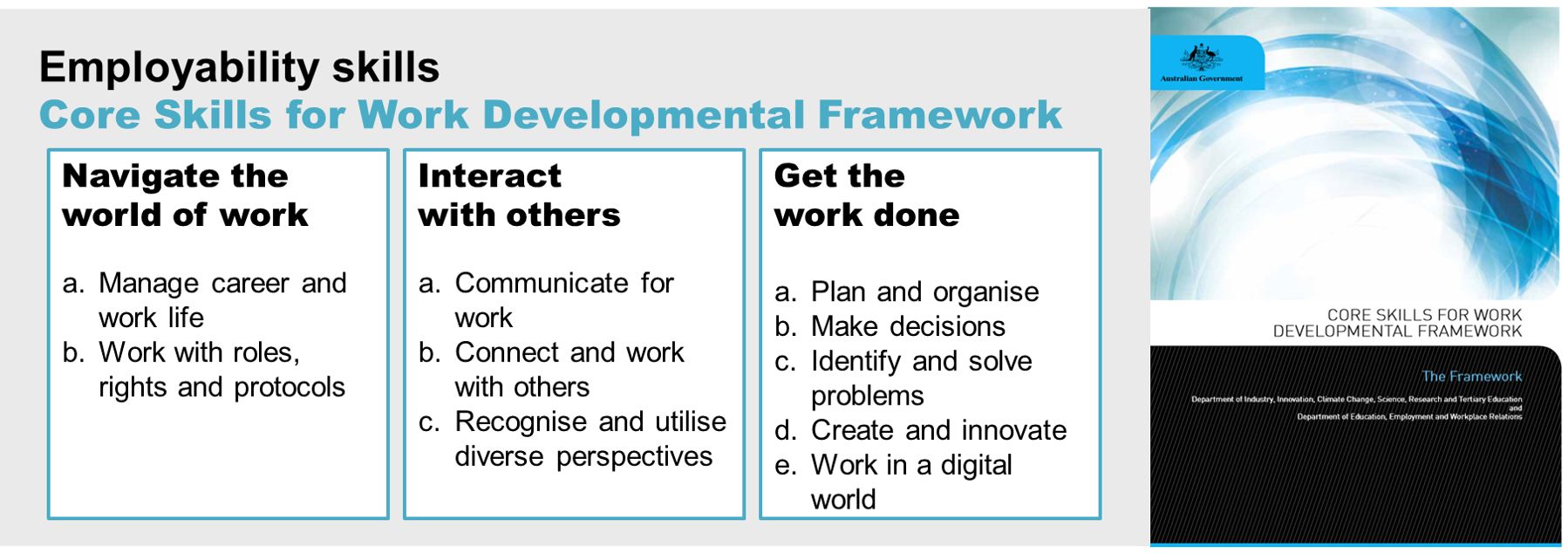
What are foundation skills?
Foundation skills are the skills people need to complete work, education or community-based activities. These skills include:
- Language, literacy and numeracy (LLN) skills
- Employability skills that people need to adapt and thrive in work, education and community contexts.
Adaptation of the definition of foundation skills given in the
National Foundation Skills Strategy for Adults, 2012, p.2
In Australia, 3 popular frameworks we can use to identify and develop our learners’ foundation skills are:
- the Australian Core Skills Framework (ACSF) to name and describe examples of language, literacy and numeracy-related foundation skills
- the Australian Digital Capability Framework (ADCF) – this framework is a welcome addition to the library of foundation skill frameworks currently available to VET practitioners
- the Core Skills for Work Developmental Framework (CSfW) to name and describe examples of employability skills (the CSfW is not the only framework available to describe employability skills, but it is the framework we feature on this site).
The diagrams below list the core foundation skills described in the ACSF, ADCF and CSfW:



Why are foundation skills important?
Foundation skills are essential for successful participation in work, education and community life:
- Work—
Today’s world of work requires a workforce with strong foundation skills. It is no longer enough to simply be able to perform a work activity. Modern workers must also be able to continuously adapt to new situations and requirements; they must solve problems and create new ways of working, prioritise and manage workload, and communicate and collaborate in a culturally appropriate way, both verbally and in writing. - Education—
The notion of lifelong learning has never been more important than in the 21st century. The rate of change in today’s world of work means that adults must learn new skills and knowledge more often and in more varied ways. To learn continuously, adults must develop the skills needed to be effective in both formal and informal learning contexts. - Community—
People with higher foundation skills are more likely to connect with, participate in, and contribute to community life as well as obtain employment, experience better health and engage in further education.
Yet, research evidence shows that many Australian adults have foundation skill levels that will make it hard for them to engage with current and future employment, education and community life.
How can we address foundation skills?
To address foundation skill needs, organisations—and educators—should systematically do four things:
First, identify the foundation skills needed to ‘do the job’
Identify the foundation skills learners will need to:
- successfully engage in learning activities and achieve learning outcomes
- perform the work or community-based activity to be trained.
Next, identify learners’ foundation skills and needs
Identify learners’ foundation skill levels and needs before the learning event begins. Then, allow them to enrol in the learning only if:
- they demonstrate the levels of foundation skills needed to successfully engage in learning activities, achieve learning outcomes and attain competence
OR - you and your organisation have the resources and expertise available to effectively support the learners, helping them develop the required foundation skills as they progress through the learning program.
Then, develop and implement support strategies
Develop strategies to support and build learners’ foundation skills as part of the learning.
For example, when teaching customer service, assess, teach and practice the oral communication and rapport-building skills that learners will need to provide customer service on the job.
And, assess continuously
Devise and implement frequent formative assessment activities that let learners practice the foundation skills needed to perform the work, educational or community activities you are training.
Actively monitor progress—acknowledge efforts, reward achievements and continuously adjust your approach in response to progress made.
More information
Expand on your foundation skills toolkit:
- Browse the resource repository on this site
- Find out if your organisation has specialist foundation skill support available to help you and your learners
- Join a community of practice—connect with colleagues or a wider online network to share ways to support foundation skill development
- Participate in foundation skill-related professional development activities offered by peak bodies.

Foundations skills is the life learning language. Critical in today’s modern world of continual improvement and or up-skilling. foundation skills is the new workplace return on investment currency.
LikeLiked by 1 person
Thank you for your comments about the importance of foundation skills – for a life of learning – to continuously develop skills and knowledge to enable you to do what you need or want to do. Yes, there is an increasing body of evidence (in Australia) that shows the potential financial benefits to organisations if they develop workers’ foundation skills.
LikeLiked by 2 people